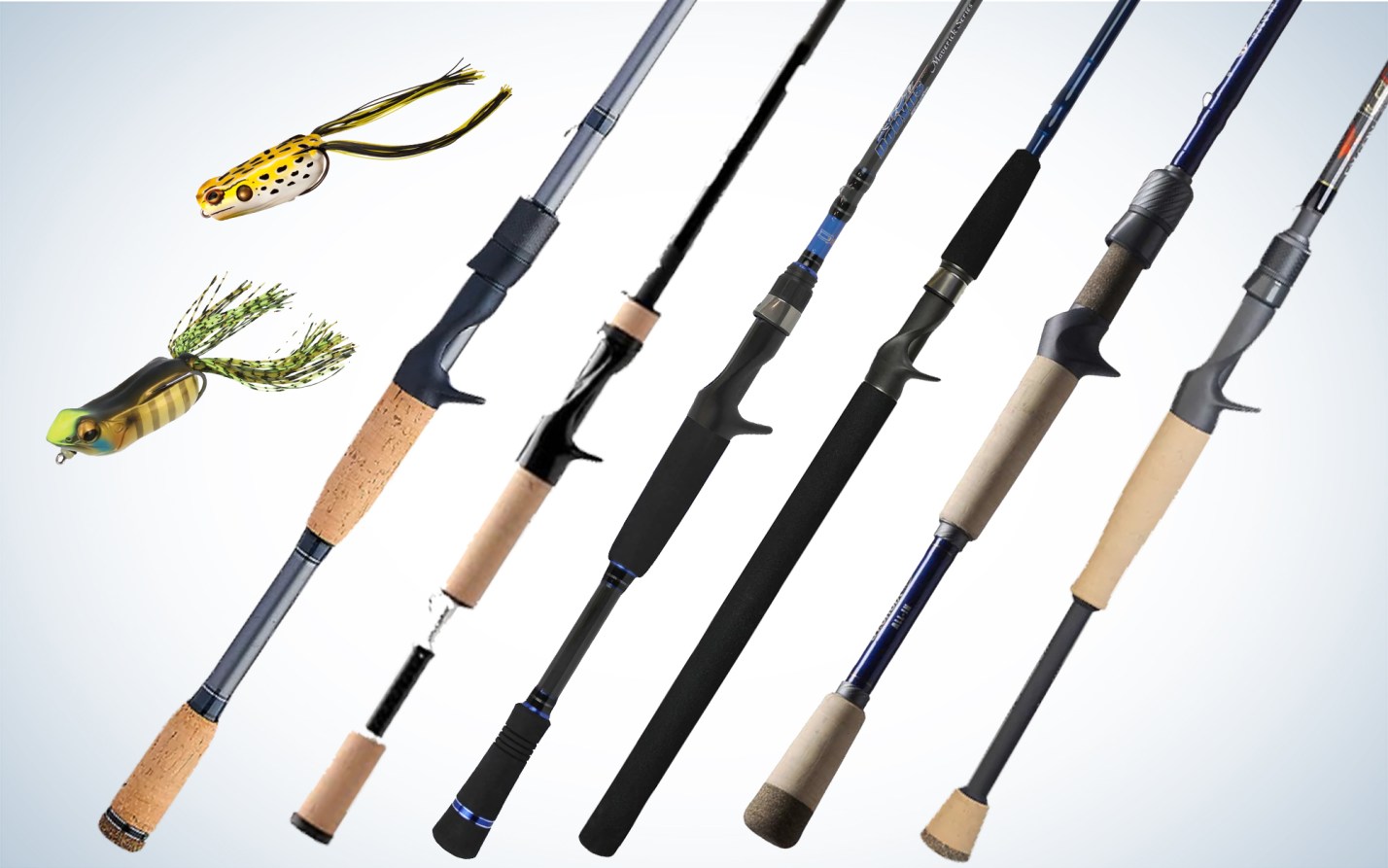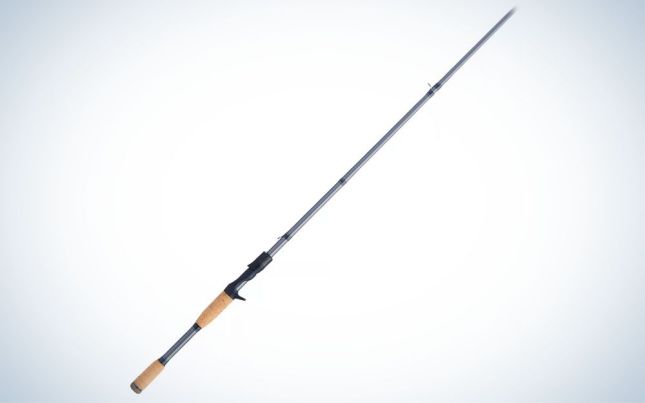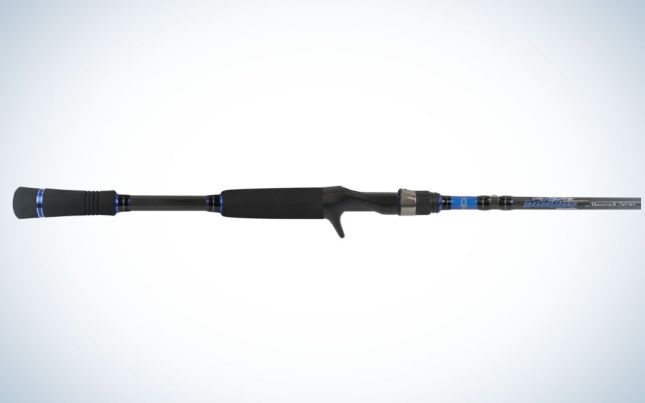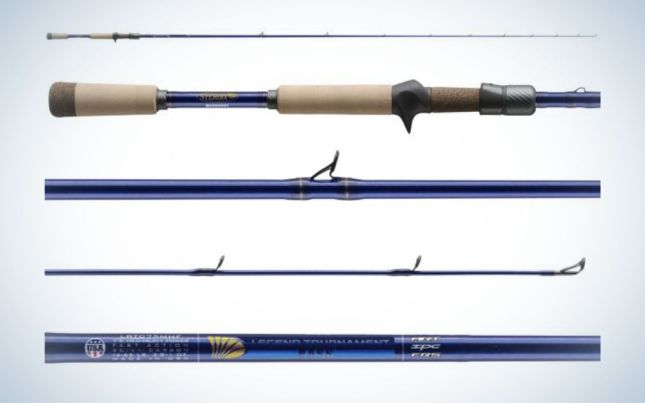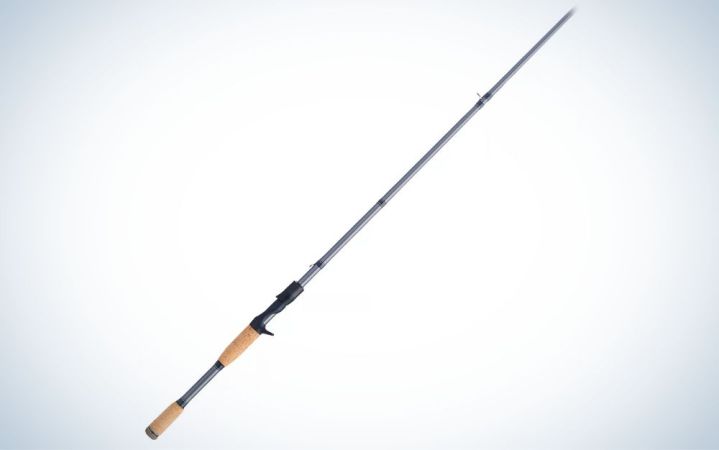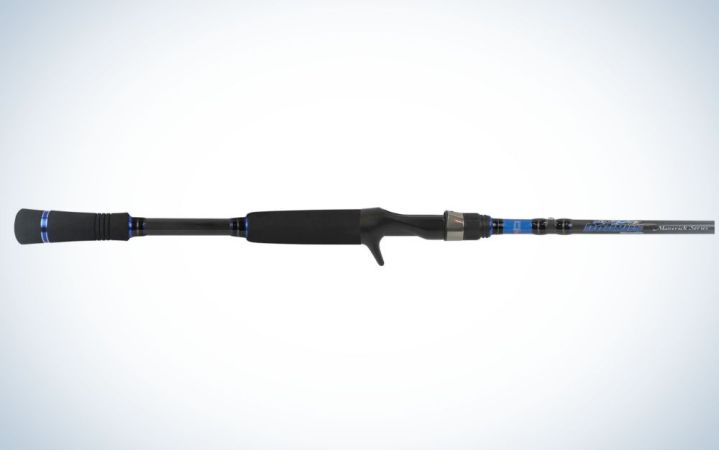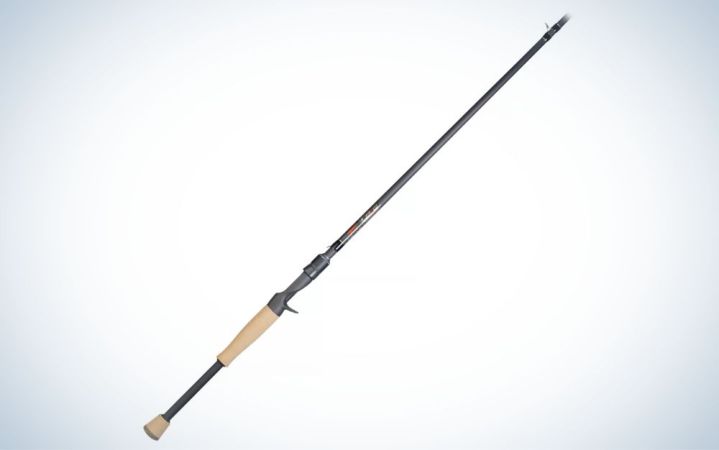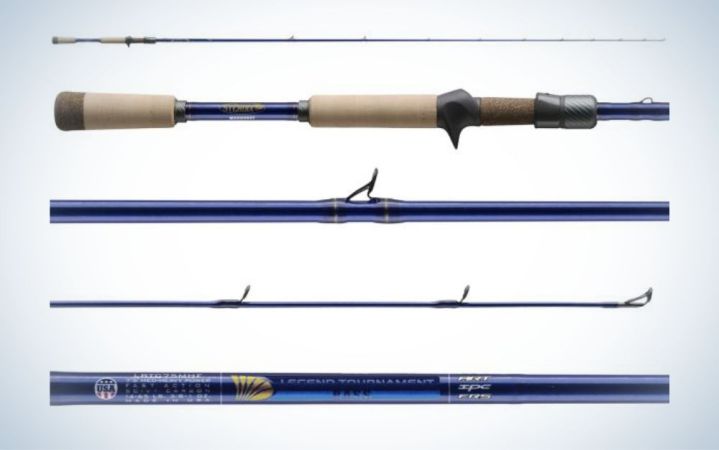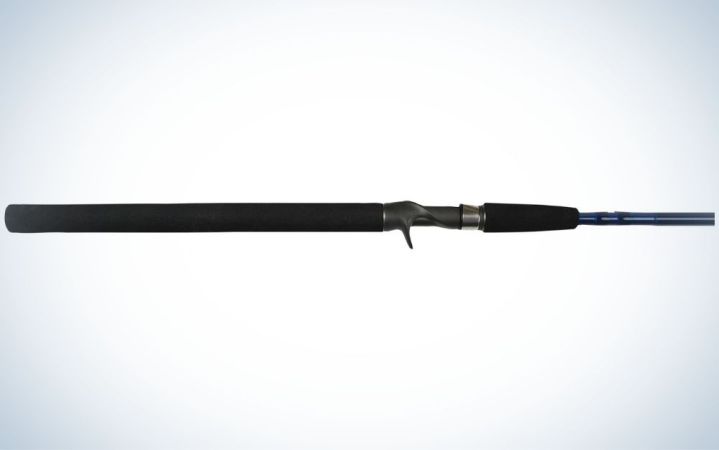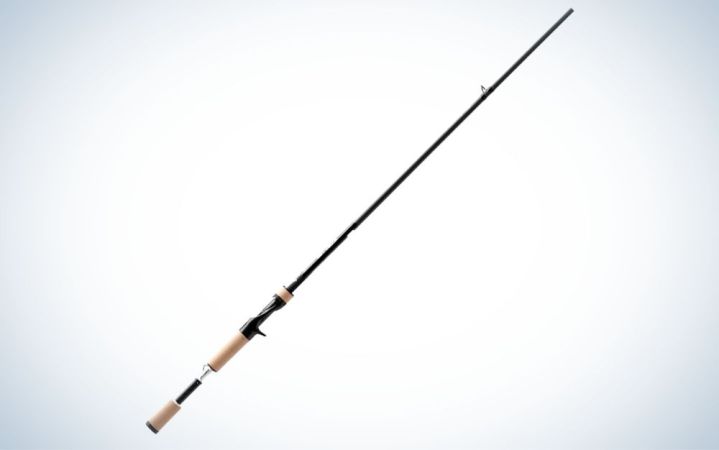We may earn revenue from the products available on this page and participate in affiliate programs. Learn More ›
Having the right frog is critical if you want to elicit great topwater strikes, and having the right frog rod is imperative if you want to convert those strikes to catches. As frogging has progressed over the past two decades from a limited window opportunity, to a more widely applicable technique, the need for different rods has expanded. So too has the number of frogs that are available—the same rod that works for a 1/4 ounce finesse hollow body frog might not be as good for a 3/4-ounce version, or a fast-moving buzz toad. The long rod that allows anglers to bomb casts to distant targets might be unwieldy for an angler trying to skip that same frog under low-hanging branches.
Of course, rod choices are always a matter of personal preference, and the nice thing about today’s market is that manufacturers tailor their offerings to those preferences. Whereas once you might have had to use a flipping stick or your medium-heavy worm rod to go frogging, now some manufacturers actually offer several models specifically for the technique—along with some others that might serve in a pinch. Here are my picks for the best frog rods.
- Best Overall: Fenwick ELTB73MH-XFC
- Best for the Money: Dobyns Maverick MK 735C
- Best for Skipping and Close Quarters Fishing: Falcon Cara Heavy Eye Crosser
- Best for Heavy Cover: St. Croix Legend Tournament Bass Slop-N-Frog
- Best for Buzz Toads: Douglas LRS C745F
- Best Utility Player: 13 Fishing Omen Black 3 OB3C74H
Best Overall: Fenwick ELTB73MH-XFC
Best Overall
Why It Made the Cut
Loads up right for casting and skipping and offers more power than the medium-heavy label suggests
Key Features
- Length: 7 feet 3 inches
- 3/8 to 1-ounce lures
- Cork, split-grip handle
- Titanium guide with zirconia inserts
Pros
- Reasonably-priced
- Handles a wide range of frogs
- Exceptionally durable
Cons
- Some anglers may prefer EVA foam handles
Product Description
Fenwick is a legendary brand in the bass world that had fallen in and out of favor in recent years, but if this rod is any indication, they’re back in a big way. I’m rough on tackle, particularly when frogging – I boat-flip bass, I poke around to determine lake bottom composition, and I slap rod tips against the water to remove vegetation. This rod handled all of that without breaking a sweat, and I found myself picking it up repeatedly, no matter which of the best frog lures I was going to rely upon. I’m 5 feet 11 inches, and a 7-foot-6-inch rod is generally too long for me to walk a frog properly. The 7-foot-3-inch length still allowed that downward stroke, but it also gave me ample ability to make longer casts when needed. The cork grips are comfortable, and while the guides needed to be cleaned of muck after some hard frogging sessions, they held up admirably. While the rod is labeled as medium-heavy, it stores a surprising amount of power in reserve—don’t hesitate to use it in the thickest cover.
Best for the Money: Dobyns Maverick MK 735C
Best for the Money
Why It Made the Cut
At half the price of most mid-range frog rods, Maverick delivers the performance of a high-end rod.
Key Features
- Length: 7 feet 3 inches
- ¼ to 1 ½ ounce lures
- Split grip EVA handle
- Sea guides
Pros
- Insanely low price for this caliber of performance
- High-modulus graphite blanks
- Great balance for all-day casting
Cons
- May be too heavy for some finesse frogs
Product Description
Over the course of a few months, I fished a number of the best frog rods, including this one from Dobyns and another from the Dobyns Champion series that costs almost three times as much. Frankly, while the higher-end stick was a little crisper and seemed to have slightly better components, this sub-$100 rod matched it step for step in just about every measurement. In fact, I found myself reaching for it far more than some other manufacturers’ rods that cost three or four times as much. The EVA handles are super-comfortable, and like every rod in the Dobyns lineup, it’s carefully balanced. It may not be as sensitive as some other rods, but in frogging, where most of the strikes are visual, that’s not really a factor.
Best for Skipping and Close Quarters Fishing: Falcon Cara Heavy Eye Crosser
Best for Skipping and Close Quarters Fishing
Why It Made the Cut
For hand-to-hand combat at close range, this rod allows precision presentations and then the muscle to extract big fish
Key Features
- Length: 6 feet 11 inches
- ½ to 1 ½ ounce lures
- Split grip cork handle
- Low profile Fuji K frame corrosion-resistant guides
Pros
- Extremely lightweight
- “Braid-tough” guides
- Proprietary locking nut
Cons
- Some anglers might not like sub-7 foot length
Product Description
This rod bears the imprimatur of 2022 Bassmaster Classic winner Jason Christie. He didn’t win that tournament with a frog, but he’s won several other six-figure checks that way, and he knows what a frog rod needs to get the job done. This one, called the “eye crosser” has ample power to drive home a hook from a distance or in thick cover. Beyond that, though, it really excels in skipping a lure under docks and overhanging branches, or placing a frog in tight spaces. It’s an inch shy of the 7-foot mark, which makes it a little more facile, without giving up meaningful length, so you can still make long casts as needed. It’s not just the length that makes it great for skipping, though—it’s the crisp action and perfect tip, which loads and recovers at just the right tempo for precise placements. It’s tough, too, as I boat-flipped some beasts without thinking, and the rod didn’t miss a beat.
Best for Heavy Cover: St. Croix Legend Tournament Bass Slop-N-Frog
Best for Heavy Cover
Why It Made the Cut
Heavyweight champ had four-wheel drive capabilities in a sports car’s body.
Key Features
- Length: 7 feet 4 inches
- 3/8-1 ½ ounce lures
- Split grip cork handle
- Fuji K-Series Tangle-Free guides with Alconite Rings
Pros
- Fortified, reinforced blank is extra strong but still lightweight
- Comfortable Fuji reel seat
- Made in the U.S.A.
Cons
- May struggle to cast extremely light frogs a long distance
Product Description
The redesigned Legend Tournament Bass series blanks are a gorgeous shade of blue, but don’t let the cosmetics fool you—this is a heavy-duty piece of equipment. The code name “Slop-N-Frog” rings true, as this stick is made from top to bottom to extract the biggest fish from the heaviest cover. I used it not only on bass but also to manhandle 8- and 9-pound snakeheads that had 40-plus pounds of grass around them. I could see using this rod for light saltwater usage, too. It’s that beefy. Yet, at the same time, it’s light enough to fish all day and can sling a ½-ounce frog a country mile. I didn’t like it as much for skipping as some of the lighter models, but when heavy salad was in play, this was my go-to.
Best for Buzz Toads: Douglas LRS C745F
Best for Buzz Toads
Why It Made the Cut
Rod loads perfectly for exceptionally long casts and is light enough to fish all day.
Key Features
- Length: 7 feet 4 inches
- 7/16-2 ounce lures
- Split-grip high-density EVA handles
- Fuji Fazlite guides with matte finish
Pros
- Comfortable reel seat with hidden threads
- Super-lightweight
- Crisp casting action
Cons
- Length may make it hard for shorter anglers to “walk” their frogs
Product Description
This rod, another one with a deep blue blank, consistently allowed me to make longer casts with a frog or toad than any other stick in the survey. I could take a Ribbit or Horny Toad and launch it nearly into the next county without losing any accuracy or power at long range. That made it perfect for covering large amounts of water in search of finicky, spread out bass. I also liked it for other presentations that required long casts, like buzzbaits and even chatterbaits, and found the listed lure weight guidelines to be a little stingy. In fact, despite the listed rating of 7/16 to 2-ounce lures as being in its wheelhouse, I had no trouble throwing ¼ and 3/8 ounce buzzbaits on this fun-to-fish baitcasting rod.
Best Utility Player: 13 Fishing Omen Black 3 OB3C74H
Best Utility Player
Why It Made the Cut
A frog rod that covers a lot of bases at a reasonable price
Key Features
- Length: 7 feet 4 inches
- 3/8-1 ½ ounce lures
- Split-grip cork handle
- ALPS 316 stainless steel guides with zirconia inserts
Pros
- Priced well
- Balanced, lightweight construction
- Blank-thru handle design
Cons
- Hook hanger behind reel seat may be polarizing
Product Description
I’ve fished several of the 13 Fishing Omen Black rods, both spinning and baitcasting, and I’ve found them to be solid, workmanlike sticks. Not a lot of flash, but they get the job done in a variety of contexts, and I frequently find myself gravitating to them over some higher-priced rods. The only problem with this one is that my wife took a liking to it, claiming that the handle fit her hands perfectly, and therefore I had a hard time getting enough time with it. When I did, however, I was pleased with its performance. It’s light and remarkably strong, and the high-quality cork is pleasant to hold even on humid 100-degree days. Moreover, I found this rod to be remarkably versatile. It’s a great frog stick, but if you’re looking for a tool that can also pitch a jig or Texas rig, or cast a Carolina Rig, it will serve you well for multiple purposes, 12 months out of the year.
Things to Consider
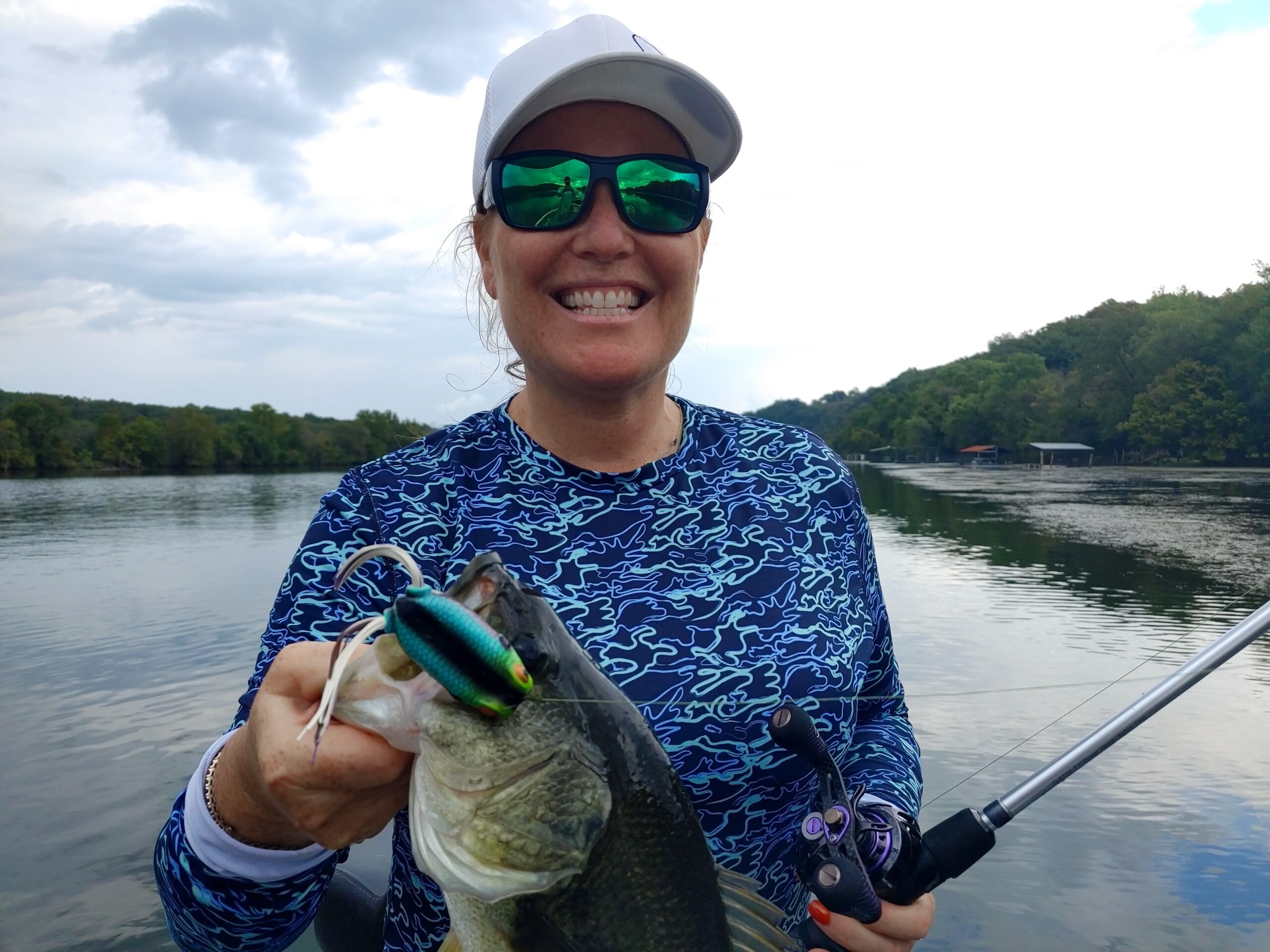
As you get serious about learning how to catch bass on frog baits, you’ll want a specialized setup for frogging. Here are somethings to consider as you make your choice.
Length
Most serious froggers like a rod that’s at least 7 feet long, which maximizes casting distance and leverage, but some shorter anglers may have trouble making a downward sweep of the rod to work the frog with anything much longer than that. That’s doubly true if they’ll be skipping the frog under docks or overhanging branches. It may take two rods to be fully covered—one for long-distance frogging and another for close-quarters combat. If you can find one that does double duty, more power to you.
Power
Most frogging is done in and around thick cover, so a light or medium rod won’t get the job done. It’s critical to be able to turn that fish’s head quickly and extract him if he gets buried in the greenery. At the same time, a broomstick rod won’t allow anglers to cast long distances or work a frog nimbly. That’s why the perfect mix of power and action complement each other, rather than detracting from each other’s strengths.
Handle
A long handle provides leverage and casting distance but may prove to be a nuisance for skipping. Different hand sizes demand different lengths and diameters, too. Because this is a highly physical form of fishing, anglers with strong preferences for cork over EVA, or vice versa, should stick with their comfort zone or risk being miserable all day.
Budget
There are solid frog rods at all points on the cost spectrum. Fortunately, sensitivity is not at a premium. However, light weight and balance may be, so don’t sacrifice there just for the sake of a few bucks. Furthermore, because this is so rough and tumble, make sure components are top-notch. Guides should be braid-ready, and reel seats should not come loose on a blistering hook set.
FAQs
Most anglers prefer frog rods from 7 feet to 7 feet 9 inches and heavy to extra heavy power. If you’re not sure where you fall in that spectrum you can’t go wrong with a heavy, fast, 7-foot 4-inch rod.
The best frog fishing line for bass is a heavy braid. Most anglers use lines from 50 to 65 pounds for frogging.
Most anglers don’t use a leader for frog fishing and instead tie directly to braid. However, if you’re fishing a finesse frog in light cover and clear water, a monofilament leader could be beneficial.
A medium-heavy power can be used for single hook or finesse frogs that don’t require a lot of power to set the hook.
Methodology
I’ve frog fished from the California Delta to Mexico to Missouri to New Hampshire, but my home stomping grounds are the grass-laden Potomac River. The river contains not just frog-eating bass, but also snakeheads. The latter grow larger, bite more aggressively, and tend to miss your frogs more often. That makes dialing in the presentation even more critical, and that starts with having the proper tools. You need a rod that can stand up to heavy braid, winch a big fish out of a deep mound of salad, and withstand getting mucked up. Over a period of months, I took on the hardship of frogging to the extreme, even when I thought a Chatterbait, swim jig, or Senko might’ve served me better.
Final Thoughts
Frogging is a highly addictive manner of fishing. Indeed, I know that I gravitate to it whenever possible, and I have some friends who live and die by it on tournament day. That’s because while it might be high-risk—lost fish, heavy cover, missed strikes—the rewards can be exceptional. When it’s on, it often produces a better class of fish in places where other anglers fear to tread. Nevertheless, it’s not for the faint of heart. One mistake, and you’re left with awful memories. Having one of the best frog rod for your particular circumstances makes a huge difference. Figure out how far and where you’ll be casting, what kinds of frogs work best, and a budget. That will make choosing the right frog rod an easier task.
- Best Overall: Fenwick ELTB73MH-XFC
- Best for the Money: Dobyns Maverick MK 735C
- Best for Skipping and Close Quarters Fishing: Falcon Cara Heavy Eye Crosser
- Best for Heavy Cover: St. Croix Legend Tournament Bass Slop-N-Frog
- Best for Buzz Toads: Douglas LRS C745F
- Best Utility Player: 13 Fishing Omen Black 3 OB3C74H
